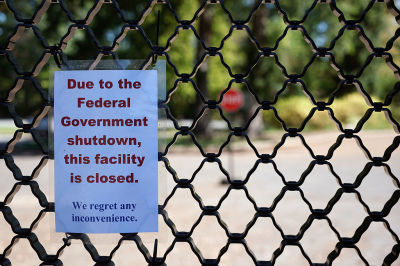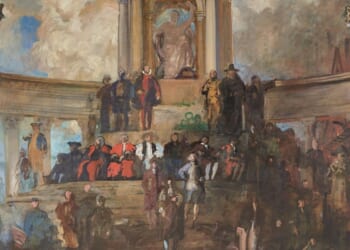
Who was responsible for the longest government shutdown in history? Look no further than those enraged at the news that it may soon end. “The Democratic base is seething,” reports Politico. Liberal social media is on fire Monday, with activists, pressure groups, and wannabe Democratic senators and presidents falling over one another to condemn the deal in ever-louder terms.
On Monday night, the Senate passed legislation by a 60-40 vote that would fund the government through January 30. The House then passed the bill 222-209, and President Trump signed the government funding package late Wednesday night.
House Minority Leader Hakeem Jeffries (D-N.Y.) and House Progressive Caucus leader Pramila Jayapal (D-Wash.) both promised to vote against the bill in the House, and even Democratic senators are slamming their eight colleagues who voted to reopen the government.
Their basic contention is that their Democratic colleagues effectively caved by flipping their votes for nothing more than a promised future vote on extending Obamacare subsidies — a Santa’s pack full of leftist sweets. Majority Leader John Thune (R-S.D.) is expected to schedule a vote on an Obamacare bill prepared by Democrats sometime in mid-December.
But progressives are furious at failing to obtain their objective in the shutdown, which was to force the Republican majority to vote for the $1.5 trillion in new health care spending, which Republicans have never voted on before. If the Democrats’ gambit had succeeded, it “would have been the first time a minority party, Democrat or Republican, successfully extracted policy concessions by shutting down the government. That’s never happened before, and it ain’t happening now,” said Quena González, senior director of Government Affairs at Family Research Council, in comments provided to The Washington Stand.
Still, progressives know that they didn’t win anything out of the shutdown. As DNC Vice Chair Malcolm Kenyatta complained, “Any ‘deal’ that ends with Dems just getting a pinky promise in return is a mistake.” There was “no direct policy concession,” González explained. In fact, the deal that Democrats eventually took was one Leader Thune had offered weeks ago: keep the government funded now, to vote on Obamacare subsidies later.
This was a fair deal for Democrats, since House Republicans had passed a “clear” continuing resolution (CR), which kept the government funded at Biden-era spending levels. But Democrats rejected the deal for weeks, voting 14 times to reject that “clean CR.” “The hardcore Democrat base is set on extending the subsidies and shutting down the government pretty much indefinitely until they get their way,” observed González.
However, “the realistic wing of the party was already beginning to see what was never going to happen,” he added. The fact that Senator Dick Durbin (D-Ill.), the number two-ranking Democrat in the Senate, was one of the eight who crossed the aisle to fund the government shows that, “privately, Democrats knew that this day was coming,” González continued. “They knew that, if Republicans held together, they were going to have to compromise on this and that they were going to have to yield.”
To give cover for Democrats facing competitive elections to vote for reopening the government, they had to “have a sacrificial lamb in leadership to take a vote that everybody knew was going to have to be taken,” González explained. After Senate Minority Leader Chuck Schumer (D-N.Y.) was roasted by his party for taking a similar vote this spring, the uncomfortable duty fell to his second-in-command (not that Schumer has avoided criticism this time). The 80-year-old Durbin doesn’t plan to run for reelection again anyway.
As a further sign supporting this theory, González pointed to the fact that “they got exactly enough Democrats” to advance cloture. “No Democrat who didn’t absolutely have to vote for it, did,” he said. “The vote tally was clearly very calculated … And so, obviously, although Schumer was a big public ‘no’ on this, he was obviously whipping behind the scenes to make sure this thing passed.”
Ironically, even parts of the Democratic base had recognized the inevitability of this outcome. Weeks ago, government employee unions were already calling for Congress to pass a clean CR to reopen the government — exactly the plan Republicans had advanced.
The deal struck in the Senate does vary from the CR the House passed in September, which would have kept the government open until November 18. Thune plans to replace that text with one that keeps the government funded until January 30.
The new deadline is “a win all the way around for conservatives … really one of the best-case scenarios that we could have hoped for,” González argued. “Appropriators had wanted something that would end around Christmas time, so we’d be right back here over Christmas, and appropriators would have the upper hand to lard this thing up with earmarks and kill conservative provisions.”
The Senate deal also includes the three appropriations bills that have passed through committee in the Senate. “There’s a lot to be left to be desired in the Senate version of those, because those were designed on a bipartisan basis,” González conceded. “They left out a lot of the great stuff that was in the House version of those bills.”
In the end, though, the longest government shutdown in history ended up being “a futile attempt by Democrats to achieve something that they had to have known all along was improbable and probably impossible: winning policy concessions by shutting down the government,” González summarized.
Conventional wisdom holds that no one ever wins a shutdown. But oftentimes it’s more important in Congress to stop bad ideas than advance good ones. By sticking together, Republicans achieve that here.
Now that some Democrats have broken ranks to reopen the government, the media narrative that Republicans were responsible is exposed as the farce that it always was. “People who voted against reopening the government denounced the vote, and vow to fight on were never against the shutdown,” argued National Review’s Dan McLaughlin. “There is no way to reconcile the furious response with the wholly false claim that it was Republicans, not Democrats, who shut down the government. It was always a lie, and they always knew it was a lie.”
On MSNBC, former Harris aide Symone Sanders Townsend criticized the Democrats who caved. “If they don’t get anything but a promise to vote later, then how do Senate Democrats explain the last 40 days to the people who have suffered?”
That’s a good question, but the proper time to ask it was before Democrats caused the suffering.
Originally published at The Washington Stand.
Joshua Arnold is a senior writer at The Washington Stand, contributing both news and commentary from a biblical worldview.
















